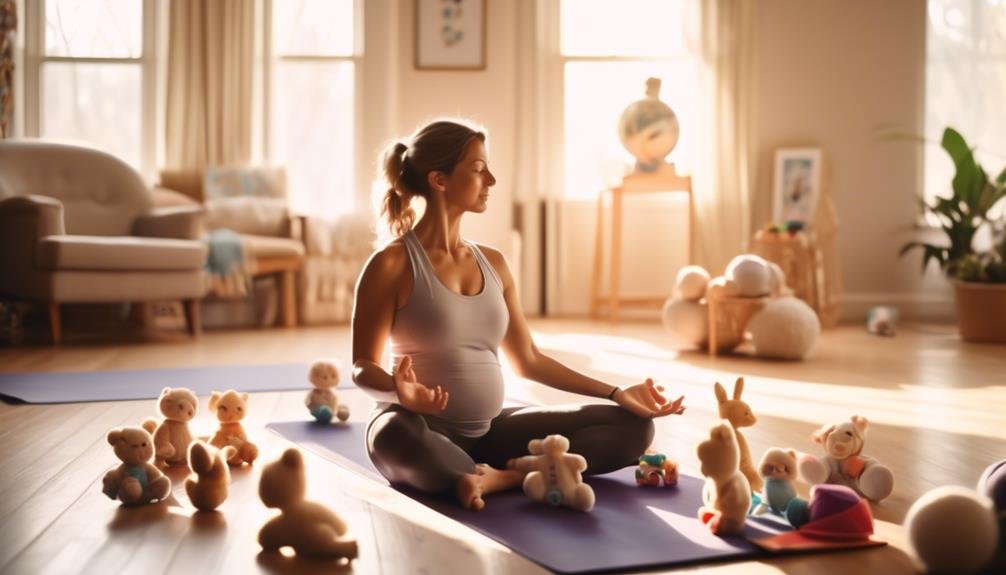"Cherishing Little Steps - A Haven for Baby and Family Journeys"
Gentle Fitness Post Baby
You may be thinking, 'After having a baby, shouldn't I be focusing on rest and recovery instead of jumping into fitness?'
While it's true that your body needs time to heal postpartum, gentle fitness can actually be beneficial for your overall well-being.
The key is to approach it with a realistic mindset and prioritize self-care.
In this discussion, we will explore the importance of gentle fitness for new moms, including gentle yoga, low-impact cardio workouts, strength training, pelvic floor exercises, and finding time for self-care.
So, if you're wondering how to safely and effectively incorporate fitness into your post-baby routine, keep reading to discover some practical tips and stay motivated on your journey to a healthier you.
Key Takeaways
- Gentle fitness, such as walking, is important for postpartum recovery and overall well-being.
- Setting small, achievable goals and being flexible with your routine is crucial for success.
- Gentle yoga, low-impact cardio workouts, and strength training are effective forms of gentle fitness for new moms.
- Pelvic floor exercises should be incorporated for postpartum recovery, and self-care is essential for physical and mental health.
The Importance of Gentle Fitness

Gentle fitness is of utmost importance for you as a new mother, as it not only promotes your physical well-being but also aids in your postpartum recovery and overall mental health. One of the most beneficial and accessible forms of gentle fitness is walking. Not only is it low-impact and easy to do, but it also offers numerous benefits for your body and mind.
Walking helps to strengthen your muscles, improve your cardiovascular health, and boost your energy levels. It can also help you shed those extra pregnancy pounds and improve your mood by releasing endorphins.
In addition to walking, nutrition plays a crucial role in post-baby fitness. As a new mother, it's important to fuel your body with the right nutrients to support your physical recovery and replenish your energy levels. A well-balanced diet that includes lean proteins, whole grains, fruits, and vegetables is essential. These foods provide the necessary vitamins, minerals, and antioxidants that promote healing and support your overall well-being.
It's also important to stay hydrated by drinking plenty of water throughout the day.
Setting Realistic Goals

When it comes to setting realistic fitness goals post-baby, it's important to remember that everyone's journey is unique and there's no one-size-fits-all approach. Managing postpartum body image can be challenging, as your body has gone through significant changes during pregnancy and childbirth. It's normal to feel self-conscious or dissatisfied with your appearance, but it's crucial to be kind to yourself and focus on what your body has accomplished.
Balancing motherhood and fitness goals can be a juggling act. As a new mom, you have a lot on your plate, and it's important to prioritize self-care without feeling guilty. Start by setting small, achievable goals that fit into your daily routine. This could be as simple as taking a short walk or doing a quick workout at home. Be flexible and adaptable, knowing that some days you may have more time and energy than others.
Remember that progress isn't always linear. There will be setbacks and challenges along the way, but that doesn't mean you should give up. Celebrate the small victories and be patient with yourself. Surround yourself with a supportive community of other moms who understand what you're going through. They can provide encouragement, advice, and motivation when you need it most.
Setting realistic fitness goals post-baby is about finding a balance between taking care of yourself and being present for your little one. Trust your instincts, listen to your body, and be kind to yourself throughout this journey. You're strong, capable, and deserving of self-care.
Gentle Yoga for Post-Baby Body

As you navigate through your postpartum journey, incorporating gentle yoga into your fitness routine can be a beneficial way to nurture and strengthen your body. After giving birth, it's important to focus on gentle exercises that support your body's recovery. Yoga is a perfect choice as it combines gentle movements, deep breathing, and mindfulness to help you regain strength and flexibility.
Here is a simple yet effective yoga routine to incorporate into your postpartum exercise regimen:
| Pose | Benefits | Tips |
|---|---|---|
| Child's Pose | Relieves lower back pain and calms the mind | Place a blanket or bolster under your hips if you feel any discomfort. Take deep breaths and surrender to the pose, allowing your body to relax and release tension. |
| Cat-Cow | Stretches the spine and releases tension in the neck and shoulders | Move with your breath, inhaling as you arch your back into the cow pose, and exhaling as you round your spine into the cat pose. Focus on creating fluid movements and connecting with your body. |
| Bridge Pose | Strengthens the glutes and opens the chest and shoulders | Keep your feet hip-width apart and press into your heels to lift your hips. Engage your core and squeeze your glutes. Take slow, deep breaths, and feel the stretch through your chest and shoulders. |
Low-Impact Cardio Workouts

Incorporating low-impact cardio workouts into your post-baby fitness routine can be a great way to increase your heart rate and boost your energy levels without putting excessive strain on your recovering body. After giving birth, your body needs time to heal and regain strength, and low-impact cardio exercises provide the perfect balance between staying active and allowing your body to recover.
One of the best low-impact cardio workouts you can try is swimming. Not only does swimming provide a full-body workout, but it also has numerous benefits for your post-baby body. The buoyancy of the water reduces the impact on your joints, making it gentle on your body while still giving you an effective cardiovascular workout. Swimming also helps to improve your lung capacity and strengthen your muscles without adding any strain to your recovering body.
Additionally, swimming is a great way to relieve stress and relax. The soothing sensation of being in the water can help you release tension and feel refreshed. It also provides a sense of weightlessness, which can be particularly beneficial if you're carrying some post-baby weight.
Remember to start slowly and listen to your body. Gradually increase the intensity and duration of your swimming sessions as you feel more comfortable. And don't forget to enjoy the process! Incorporating low-impact cardio workouts like swimming into your post-baby fitness routine can help you not only regain your pre-pregnancy fitness levels but also improve your overall well-being.
Strength Training for New Moms

If you're looking to further strengthen your post-baby body, incorporating strength training into your fitness routine can be a game-changer. Not only does it help you regain your strength and tone your muscles, but it also has numerous benefits for your overall well-being.
Here are some reasons why strength training is essential for new moms like you:
- Boosts metabolism: Strength training increases muscle mass, which in turn helps to boost your metabolism. This means that even when you're not exercising, your body will be burning more calories throughout the day.
- Increases bone density: Pregnancy and breastfeeding can deplete your bone density, but strength training helps to combat this by stimulating bone growth and improving bone density.
- Enhances mood: Exercise, including strength training, releases endorphins that can improve your mood and reduce feelings of stress and anxiety.
- Improves posture and stability: After pregnancy, your posture may be affected due to the changes in your body. Strength training can help strengthen your core and back muscles, improving your posture and stability.
- Promotes weight loss: Strength training, combined with a balanced diet and regular cardio exercise, can help you shed those extra pounds and get back to your pre-baby weight.
To get the most out of your strength training routine, remember to prioritize nutrition by consuming a balanced diet rich in lean proteins, whole grains, fruits, and vegetables. Additionally, always consult with your healthcare provider before starting any new exercise program to ensure it's safe for you and your baby.
Incorporating Pelvic Floor Exercises

To effectively strengthen your post-baby body, it's important to incorporate pelvic floor exercises into your fitness routine. These exercises are crucial for postpartum recovery and can help manage diastasis recti, a condition where the abdominal muscles separate during pregnancy.
The pelvic floor muscles play a vital role in supporting your organs, maintaining bladder control, and enhancing sexual pleasure. They can become weakened during pregnancy and childbirth, which is why it's essential to give them some extra attention.
One effective exercise to target the pelvic floor muscles is called Kegels. To do this exercise, simply contract and relax the muscles that you'd use to stop the flow of urine. Start by holding the contraction for a few seconds and gradually increase the duration as you get stronger. Aim for three sets of ten repetitions per day.
Another excellent exercise for pelvic floor strength is the bridge pose. Lie on your back with your knees bent and feet flat on the floor. Slowly lift your hips off the ground, engaging your glutes and pelvic floor muscles. Hold this position for a few seconds before lowering back down. Repeat this exercise for ten to fifteen repetitions.
Finding Time for Self-Care

Now that you've learned how to effectively strengthen your post-baby body by incorporating pelvic floor exercises, it's important to prioritize finding time for self-care. As a new mom, finding balance between taking care of your little one and taking care of yourself can feel overwhelming. However, self-care isn't just a luxury, but a necessity for your overall well-being.
Here are some self-care tips to help you navigate this new chapter of your life:
- Carve out dedicated 'me time': Whether it's a few minutes in the morning before everyone wakes up or a quiet moment during nap time, find a time each day to focus solely on yourself. Use this time to do something that brings you joy, whether it's reading a book, taking a walk, or practicing meditation.
- Prioritize sleep: Getting enough rest is crucial for your physical and mental health. Try to establish a sleep routine that allows you to get the rest you need. Take turns with your partner for night-time feedings and consider asking for help from family or friends to give yourself a break.
- Nourish your body: Eating nutritious meals and staying hydrated is essential for your energy levels and overall well-being. Prepare healthy snacks and meals in advance, and don't forget to drink plenty of water throughout the day.
- Connect with others: Surround yourself with a support system of friends, family, and other moms who understand what you're going through. Join a mom's group or find online communities where you can share your experiences and receive support.
- Practice self-compassion: Remember to be kind to yourself and give yourself grace. It's normal to feel overwhelmed at times, and it's okay to ask for help when you need it. Take small steps towards self-care and celebrate your accomplishments along the way.
Finding time for self-care may require some creativity and flexibility, but it's an investment in your own well-being. By prioritizing self-care, you'll not only be better equipped to care for your baby, but you'll also be nurturing your own happiness and fulfillment. You deserve it.
Staying Motivated on Your Fitness Journey

Staying motivated on your fitness journey can be challenging, but with the right mindset and strategies, you can overcome any obstacles and achieve your goals. It's important to remember that fitness isn't just about reaching a certain number on the scale or fitting into a specific dress size. It's about taking care of yourself, both physically and mentally, and creating a healthy lifestyle that you can sustain in the long run.
One key to staying consistent on your fitness journey is finding activities that you genuinely enjoy. When you find joy in your workouts, it's easier to stay motivated and committed. Experiment with different types of exercises until you find what resonates with you. It could be dancing, yoga, swimming, or even hiking. The options are endless.
Another strategy to overcome obstacles is to set realistic goals and break them down into smaller, achievable steps. This way, you can celebrate your progress along the way and stay motivated. Remember that setbacks are a normal part of any journey, so be kind to yourself and don't let them discourage you. Instead, use them as opportunities to learn and grow.
Lastly, find a support system that understands and encourages your fitness goals. Surround yourself with positive and like-minded individuals who can offer guidance and motivation. Whether it's a workout buddy, a fitness group, or an online community, having people who cheer you on can make a world of difference.
Frequently Asked Questions
How Soon After Giving Birth Can I Start With Gentle Fitness Exercises?
You can start with gentle fitness exercises after giving birth as soon as you feel ready. It's important to prioritize postpartum rest and listen to your body. Postpartum workout benefits include improved mood, increased energy, and faster recovery.
Is It Safe to Do Strength Training Exercises if I Had a Cesarean Birth?
Strength training postpartum after a cesarean birth is safe and beneficial. It helps regain muscle strength, improve posture, and boost overall fitness. Remember to start slow, listen to your body, and consult with your healthcare provider for personalized advice.
Can I Do Gentle Yoga if I Have Diastasis Recti?
Yes, you can do gentle yoga if you have diastasis recti. It's important to modify certain poses and focus on core strengthening exercises. Consult with a diastasis recti specialist for personalized guidance and treatment.
How Often Should I Incorporate Pelvic Floor Exercises Into My Fitness Routine?
You should incorporate pelvic floor exercises into your fitness routine regularly to reap the benefits. By incorporating kegel exercises, you can strengthen your pelvic floor muscles and improve bladder control. Keep up the great work!
What Are Some Tips for Finding Time for Self-Care as a New Mom?
Finding time for self-care as a new mom can be challenging, but it's essential. Some tips include carving out small pockets of time, asking for help, and prioritizing self-care activities that bring you joy and relaxation.
Conclusion
In conclusion, taking care of your body post-baby is essential, but it doesn't have to be overwhelming.
Gentle fitness is the key to gradually getting back into shape and feeling your best.
Although it may be tempting to push yourself too hard, remember to set realistic goals and listen to your body's needs.
By incorporating gentle yoga, low-impact cardio, strength training, and pelvic floor exercises, you can regain your strength and confidence at your own pace.
Remember, self-care is crucial, so find the time and stay motivated on your fitness journey.
You deserve it!



benee niebles
Kayden Frank